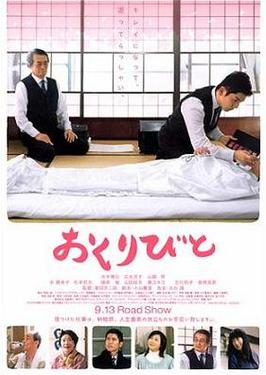It's a Japanese film about a cellist who ends up working as a "noukanshi" - a person who helps the dead prepare for their departure. They're in charge of a ritual in which they wipe the corpse, dress them in nice kimonos and put them in a coffin - all done in front of the family during the funeral.
While the protagonist starts to like his job after the initial shock, everyone around him thinks it's a disgusting job. They, however, eventually change their mind when they face the death of their loved ones. The protagonist comes over for the funeral, and as they see him help the dead prepare for their final departure - with all the make up and dressing up - they start to have a new feeling about the job, and probably about death itself.
This incident reminded me of a specific incident during anatomy. When I first found myself being scared and shocked to see the corpse, I told myself that it was someone's husband/dad/granddad instead of just a creepy dead body, and that really helped me calm down.
I guess we usually think of death as something unpleasant and creepy - something that has little to do with this side of the world we live in, but when someone close dies, we realize the obvious - that everyone dies in the end.
Some people might say the whole ritual is a waste of money and time since the dead is, after all, dead, but I got the impression that it was for the people left behind. They probably find the time and chance to say their final goodbyes when they see the dead prepare for their departure.
In case anyone's interested, the original title "Okuri-bito" means "a person(=bito=hito)" who "sends / says goodbye(=okuru)".

オーケストラのチェロ奏者としての職を失った主人公が納棺師になる話。解剖実習後の納棺で思ったことを母に話したところ、「おくりびと」を見るべきだといって送ってくれた。
生理学のレポートをわきに置いてやっと見終わらせた。
ホルマリン漬けにされたご遺体との初対面の時はぞっとした。だから、初仕事で主人公が思わず吐き散らすシーンも、その後、銭湯で神経質に体を洗うシーンも、夕飯時に生の鶏肉を見て再び吐くのも、なんとなくリアルだった。私たちは、解剖実習初日の夕飯でさえがっつりハンバーグを食べに行ったけれど、さすがに生肉は見たくないよね、と話しながら食べたのを思い出した。
そしてもう一つ思い出したのは、実習初日、ご遺体を見て、つい気味が悪い、怖いと思ってしまったときに、目の前のご遺体が、自分が知らない誰かの父親、あるいは祖父、あるいは夫であったことを思うことで、何となく安心できたこと。
映画の中で、当初、納棺師という職業に対して、主人公の妻や友人をはじめ、多くの人が偏見を抱いている。でも、銭湯のおばあちゃん(友人の母親で、主人公の妻も会話を交わしたことがある人物)の死に際して、主人公が納棺の儀式を行うことを機に、友人も妻も、主人公を偏見の目で見なくなる。そもそも、主人公が、納棺という仕事への警戒心を解くきっかけになったのも、涙を流す家族の前で行われる納棺の儀式に立ち会った時だった。
つまりそういうことなのだ、と思った。
フツウ、私たちは、死を、死人を、私たちが生きる生の世界とは反対側にある「気味が悪いもの」であると認識しているけれど、自分に近い人間や、生前の姿を知る人物の死に接すると、いつもは他人事の「死」が自分が生きる日常の一部として見えてくるのだ。
いつかはこうして自分も死ぬ。死体になって、腐って、土にかえる。当たり前の生命のサイクルだけれど、悲しみとともに突きつけられて初めて少し理解できるのかもしれない、と思った。
ところで、故人を「おくる」という儀式、これは故人本人のため、というより、残された者のための儀式なのだな、と思った。父が亡くなった時には、自ら棺を選んで気持ちのいい布団に寝かせてやりたいと、一週間たった今でも思うけれど、結局のところ、それはもはや父にとっては、もしかしたらまったく意味のないことで、ただ送る側の私がそうしたい、というだけのことなのだ。
でも、それはとても重要なことで、残された者が、悔いのないお別れができるように納棺師がお手伝いするように、医師も旅立つ患者さんだけでなく、その家族へも当然配慮しなければならないのだ、と思った。だからこそ、1時間を超す心臓マッサージが必要なこともあるのだろう。(今日はBLSの授業で心臓マッサージの方法を学び、ご家族の意思によっては、無駄だとわかっていても心臓マッサージを続けなければならない場合があると聞いた。)
「おくりびと」は、死を描く作品にはありがちなラストで、最後は主人公夫婦が新たな生命を授かる一方で、主人公は自らの父親をおくる、という筋書きになっている。しかも、30年ぶりの再会で、手に強く握られていた石を介して父親の最後の心境を知るという設定も手伝ってずいぶん感動的な仕上がりになっている。
ここでも強く意識させられるのは、死は生の反対ではなく、その一部なのだ、ということ。
たびたび映る、ハクチョウが湖から飛び立つシーンが印象的だった。将来、多くの人を見送ることになるかもしれないけれど、より多くの人たちが、あのハクチョウたちのように青空に向かって気持ちよく旅立てるようにお手伝いできればいいなと思った。
0 件のコメント:
コメントを投稿